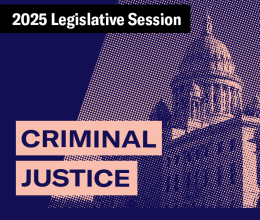By Hillary Davis, Policy Associate
As we celebrate Constitution Day, we’ve been looking at some of our favorite amendments and the importance of enshrining our fundamental rights in a powerful living document. At the same time, we would be remiss if we did not acknowledge a misstep in our Constitution’s history; one that, even though corrected, serves as a cautionary tale today.
In 1919, the Eighteenth Amendment was born. A reaction to the impact of increasingly hard and cheap alcohol on communities, the Eighteenth Amendment declared the “manufacture, sale, or transportation of intoxicating liquors” prohibited nationwide. Over past century, the Eighteenth Amendment has become a famous failure, and remains the only constitutional amendment to be repealed. (Fun Constitutional Fact: Rhode Island remains the only state never to have ratified the Eighteenth Amendment.)
Prohibition – the thirteen years between when the Eighteenth Amendment went into effect and when it was repealed through the Twenty-First Amendment in 1933 – are a lesson in unintended consequences. The problems of alcoholism did not diminish, and industries that expected to replace alcohol did not thrive. Instead, the country lost an estimated $11 billion in tax revenues while simultaneously paying $300 million to enforce the law. Prohibition brought the rise of bootlegging and the black market, as alcohol drinkers became alcohol producers – and turned alcohol from a safe substance into one that resulted in 1,000 deaths annually as a result of tainted liquor. At the same time, formerly law-abiding citizens became criminals as arrest rates exploded. A consensus soon arose that Prohibition had increased, rather than lessened, alcohol use in the United States.
The country recognized the failure of Prohibition and responded, ratifying the Twenty-First amendment to repeal the Eighteenth. A similar debate rages today around marijuana legalization and regulation.
Despite state and federal prohibitions on marijuana – costing taxpayers around $3.6 billion a year – more than 100 million Americans have used marijuana and it remains relatively easy for children and youth to obtain. In 2010, marijuana accounted for hundreds of thousands more arrests than all violent crimes combined. Although black and white individuals use marijuana at roughly equal rates, enforcement of marijuana prohibition is by no means equal. Black Rhode Islanders are 2.6 times more likely than white Rhode Islanders to be arrested for marijuana possession; in some counties, black individuals are as high as 7.4 times more likely to be arrested. Yet, despite the lessons of the Eighteenth Amendment, marijuana remains prohibited.
A s we stand to protect the rights and liberties provided by the Constitution, we must also respect and understand its lessons. Prohibition failed. The War on Drugs has too. Just as Rhode Island refused to ratify Prohibition, we can refuse to perpetuate the failed, discriminatory prohibition on marijuana and find a better way to ensure all our rights are protected. The ACLU continues to support legislation to legalize and regulate marijuana, emphasizing treatment of drug addiction over ineffective and discriminatory criminalization. Through this legislation, we hope Rhode Island can end this modern “noble experiment” once and for all.


